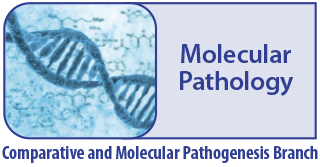
Much of the work carried out by DTT is in support of the National Toxicology Program (NTP), an interagency partnership of the Food and Drug Administration, National Institute for Occupational Safety and Health, and NIEHS.

Arun Kumar R. Pandiri, B.V.Sc. & A.H., M.S., Ph.D., D.A.C.V.P., D.A.B.T.
[email protected]

Research Summary
The Molecular Pathology Group conducts interdisciplinary research in support of the mission of the Division of Translational Toxicology (DTT) and the NIEHS, to elucidate the pathogenesis of non-neoplastic and neoplastic lesions in various organ systems resulting from exposures to numerous occupational and environmental toxicants/carcinogens.
The group employs various multi-omics approaches to understand molecular signatures of chemical carcinogenesis using archival tissues as well as in vitro approaches. In addition, the group also conducts research to understand the contribution of environmental etiologies to early onset colorectal cancers. Finally, the group serves on several DTT study design teams to advise on issues related to molecular pathology and to provide a comparative species/translational context to toxicology and carcinogenicity studies.
The goals of the Molecular Pathology Group are to:
- Use high throughput multi-omics technologies to better understand chemical-induced carcinogenesis
- Partner with DTT scientists and external collaborators in the development of screening tools to differentiate spontaneous from chemically induced tumors especially those induced by non-genotoxic modes of action
- Understand the molecular alterations underlying toxicities and related non-neoplastic lesions in various organ systems
- Collaborate with DTT and DIR investigators to further characterize pathology endpoints
The Molecular Pathology Group achieves its goals primarily by a combination of program-related and institute-wide collaborative research leveraging the core laboratory facilities within the NTP/NIEHS, and also through interagency collaborations and contract support.
Arun Pandiri leads the Molecular Pathology Group within the Comparative and Molecular Pathogenesis Branch. He earned his Veterinary degree from ANGR Agricultural University, Hyderabad, India; M.S. from the University of Arkansas, Fayetteville; Ph.D. from Michigan State University and the USDA ARS Avian Disease and Oncology Laboratory, East Lansing; and Pathology residency training at North Carolina State University, Raleigh. He is a Diplomate of the American College of Veterinary Pathologists (ACVP) and the American Board of Toxicology (ABT). He is a fellow of the International Academy of Toxicologic Pathologists (IATP) and the Academy of Toxicological Sciences (ATS). His group’s focus areas include multi-omics of chemical-induced carcinogenesis, and understanding the environmental causes of early onset colorectal cancers.
Recent Publications
- Wu X, Williams J, Liang H, Gruzdev A, Hartsell J, Shpargel J, Mainali R, Fang Y, Ji M, Duval C, Xu X, Zhang Z, Winter H, Pediaditakis P, Pandiri A, Migaud M, Jarmusch A, Yu H, Liu X, Li J, Xu X, Shats I, Li X. NAPRT-mediated deamidated NAD biosynthesis enhances colon tissue resiliency and suppresses tumorigenesis. Nature communications. 2026 Feb 10 [Epub ahead of print]. [ AbstractWu X, Williams J, Liang H, Gruzdev A, Hartsell J, Shpargel J, Mainali R, Fang Y, Ji M, Duval C, Xu X, Zhang Z, Winter H, Pediaditakis P, Pandiri A, Migaud M, Jarmusch A, Yu H, Liu X, Li J, Xu X, Shats I, Li X. NAPRT-mediated deamidated NAD biosynthesis enhances colon tissue resiliency and suppresses tumorigenesis. Nature communications. 2026 Feb 10 ]
- Xu M, Li J, Hsiao Y, Kovi R, Li J, Klimczak L, Riva L, Adams D, Bushel P, Merrick B, Gordenin D, Bucher J, Sills R, Pandiri A. Environmental carcinogens often exacerbate endogenous mutagenic processes to enhance tumor promotion. Cell reports. 2025 Jul 22;44(7):115978. [ AbstractXu M, Li J, Hsiao Y, Kovi R, Li J, Klimczak L, Riva L, Adams D, Bushel P, Merrick B, Gordenin D, Bucher J, Sills R, Pandiri A. Environmental carcinogens often exacerbate endogenous mutagenic processes to enhance tumor promotion. Cell reports. 2025 Jul 22 ]
- Cai L, Wu F, Zhou Q, Gao Y, Yao B, DeBerardinis R, Acquaah-Mensah G, Aidinis V, Beane J, Biswal S, Chen T, Concepcion-Crisol C, Grüner B, Jia D, Jones R, Kurie J, Lee M, Lindahl P, Lissanu Y, Lorz C, MacPherson D, Martinelli R, Mazur P, Mazzilli S, Mii S, Moll H, Moorehead R, Morrisey E, Ng S, Oser M, Pandiri A, Powell C, Ramadori G, Santos M, Snyder E, Sotillo R, Su K, Taki T, Taparra K, Tran P, Xia Y, van Veen J, Winslow M, Xiao G, Rudin C, Oliver T, Xie Y, Minna J. The Lung Cancer Autochthonous Model Gene Expression Database Enables Cross-Study Comparisons of the Transcriptomic Landscapes Across Mouse Models. Cancer research. 2025 May 15;85(10):1769-1783. [ AbstractCai L, Wu F, Zhou Q, Gao Y, Yao B, DeBerardinis R, Acquaah-Mensah G, Aidinis V, Beane J, Biswal S, Chen T, Concepcion-Crisol C, Grüner B, Jia D, Jones R, Kurie J, Lee M, Lindahl P, Lissanu Y, Lorz C, MacPherson D, Martinelli R, Mazur P, Mazzilli S, Mii S, Moll H, Moorehead R, Morrisey E, Ng S, Oser M, Pandiri A, Powell C, Ramadori G, Santos M, Snyder E, Sotillo R, Su K, Taki T, Taparra K, Tran P, Xia Y, van Veen J, Winslow M, Xiao G, Rudin C, Oliver T, Xie Y, Minna J. The Lung Cancer Autochthonous Model Gene Expression Database Enables Cross-Study Comparisons of the Transcriptomic Landscapes Across Mouse Models. Cancer research. 2025 May 15 ]
- Brooks A, Vornoli A, Kovi R, Ton T, Xu M, Mashal A, Tibaldi E, Gnudi F, Li J, Sills R, Bucher J, Mandrioli D, Belpoggi F, Pandiri A. Genetic profiling of rat gliomas and cardiac schwannomas from life-time radiofrequency radiation exposure study using a targeted next-generation sequencing gene panel. PloS one. 2024;19(1):e0296699. [ AbstractBrooks A, Vornoli A, Kovi R, Ton T, Xu M, Mashal A, Tibaldi E, Gnudi F, Li J, Sills R, Bucher J, Mandrioli D, Belpoggi F, Pandiri A. Genetic profiling of rat gliomas and cardiac schwannomas from life-time radiofrequency radiation exposure study using a targeted next-generation sequencing gene panel. PloS one. 2024 ]
- Pandiri A, Auerbach S, Stevens J, Blomme E. Toxicogenomics Approaches to Address Toxicity and Carcinogenicity in the Liver. Toxicologic pathology. 2023 Oct;51(7-8):470-481. [ AbstractPandiri A, Auerbach S, Stevens J, Blomme E. Toxicogenomics Approaches to Address Toxicity and Carcinogenicity in the Liver. Toxicologic pathology. 2023 Oct ]
NTP Reports
- National Toxicology Program. Toxicology and carcinogenesis studies of an isomeric mixture of tris(chloropropyl) phosphate administered in feed to Sprague Dawley (Hsd:Sprague Dawley SD) rats and B6C3F1/N mice. National Toxicology Program technical report series. 2023 Jun [Epub ahead of print]. [ AbstractNational Toxicology Program. Toxicology and carcinogenesis studies of an isomeric mixture of tris(chloropropyl) phosphate administered in feed to Sprague Dawley (Hsd:Sprague Dawley SD) rats and B6C3F1/N mice. National Toxicology Program technical report series. 2023 Jun ]
- National Toxicology Program. Toxicity studies of acetoin and 2,3-pentanedione administered by inhalation to Wistar Han [Crl:WI(Han)] rats and B6C3F1/N mice. Toxicity report series. 2023 Mar [Epub ahead of print]. [ AbstractNational Toxicology Program. Toxicity studies of acetoin and 2,3-pentanedione administered by inhalation to Wistar Han [Crl:WI(Han)] rats and B6C3F1/N mice. Toxicity report series. 2023 Mar ]
- National Toxicology Program. Toxicology and carcinogenesis studies of p-chloro-α,α,α-trifluorotoluene in Sprague Dawley (Hsd:Sprague Dawley SD) rats and B6C3F1/N mice (inhalation studies). National Toxicology Program technical report series. 2018 Jun [Epub ahead of print]. [ AbstractNational Toxicology Program. Toxicology and carcinogenesis studies of p-chloro-α,α,α-trifluorotoluene in Sprague Dawley (Hsd:Sprague Dawley SD) rats and B6C3F1/N mice (inhalation studies). National Toxicology Program technical report series. 2018 Jun ]
- National Toxicology Program. Toxicology and carcinogenesis studies of antimony trioxide in Wistar Han [Crl:WI (Han)] rats and B6C3F1/N mice (inhalation studies). National Toxicology Program technical report series. 2017 Dec [Epub ahead of print]. [ AbstractNational Toxicology Program. Toxicology and carcinogenesis studies of antimony trioxide in Wistar Han [Crl:WI (Han)] rats and B6C3F1/N mice (inhalation studies). National Toxicology Program technical report series. 2017 Dec ]
- National Toxicology Program. Toxicology studies of green tea extract in F344/NTac rats and B6C3F1/N mice and toxicology and carcinogenesis studies of green tea extract in Wistar Han [Crl:WI(Han)] rats and B6C3F1/N mice (gavage studies). National Toxicology Program technical report series. 2016 Apr [Epub ahead of print]. [ AbstractNational Toxicology Program. Toxicology studies of green tea extract in F344/NTac rats and B6C3F1/N mice and toxicology and carcinogenesis studies of green tea extract in Wistar Han [Crl:WI(Han)] rats and B6C3F1/N mice (gavage studies). National Toxicology Program technical report series. 2016 Apr ]


